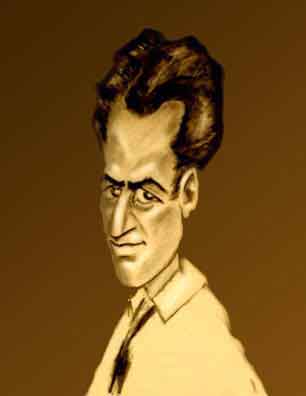William Saroyan

William Saroyan
Daring Young Man
At one time William Saroyan was one of the best known and most widely read authors in America. His 1934 book of short stories, The Daring Young Man on the Flying Trapeze was an instant hit, and he followed this success with other stories and books and plays. The tales often dealt with everyday life in the Armenian-American community and of people living lives in poverty while maintaining optimism and hope. Today fans of swords and sorcery and science fiction often find Bill's stories lacking in plot and oft times a bit too icky-sweet. One reviewer even complained that everyone in one of the books was a stereotype. Of course, this is kind of like the old lady who read Hamlet and said, "I don't know why everyone makes a big deal about it. It's nothing but a bunch of famous quotations."
For those who think these words are a derisive snort on popular culture, we will hasten to add that Bill also wrote (gasp!) scripts for television, which even in his time was often looked on as base entertainment of the lowest order. But established short story writers and novelists - not to mention playwrights - quickly recognized the small screen as a source for a quick, if one-time, paychecks. It's often forgotten that in the days of the infant medium and before 24/7 sports, reality TV, single-set sitcoms, and repetitious and overly long comedy sketch shows became the staple for couch potatoes everywhere, there were TV shows where each episode was self-contained and featured different actors and plots. These were in effect thirty-minute to one hour plays where the (relatively) low budgets and lack of substantial special effects forced the writers focus on the interplay of the characters. Shows such as "Armchair Theater", the "Omnibus" series, and the "Play of the Week" were perfect vehicles for scripts either written wholly by Bill or adapted from his stories. Bill himself appeared on various early talk shows like "The Today Show", "The Merv Griffin Show", and "The Tonight Show" with Johnny Carson.
Certainly, Bill's most successful book was The Human Comedy about a young boy living in Depression-era California, helping his family get by while more or less living on his own terms. The book was made into a motion picture staring Mickey Rooney, and ended up winning Bill his Oscar for best original work. That honor supplemented his 1940 Pulitzer Prize in Drama for The Time of Your Life. Yes, Bill did alright.
Bills famous quote, "Everybody has got to die, but I have always believed an exception would be made in my case", sounds a lot like an latter-day Internet invention. But it was related by people who knew Bill long before cyberspace began to replace the printed page. The actual statement, though, had a "Now what?" somewhat unnecessarily tacked on the end. A writer friend of Bill said as with everything Bill wrote, it needed editing, and a criticism of Bill's work is that sometimes he just didn't know when to stop.
If there's one thing Bill had it was a belief in his own talent. Random House publisher (and What's My Line panelist) Bennett Cerf wrote about the time Bill went into the army in World War II. Bennett was in his office, and the phone operator called and said, "A man who says he is the world's greatest author is here to see you." Bennett simply answered, "Send Private Saroyan in."
Alas, although the story was told first hand by Bennett in his book Try and Stop Me, when he related the story in his memoirs At Random, he effectively denied it ever happened.
>References
William Saroyan: The Man and the Writer Remembered, Leo Hamalian (Editor), Fairleigh Dickinson University Press, New Jersey, 1987. A set of first hand recollections of Bill.
Try and Stop Me, Bennett Cerf, Simon and Schuster (1945). The story about Bill saying he was the world's greatest author is on page 105. Bennett was well aware that the anecdotes he wrote about were of dubious quality. One of Bennett's friends told him how much he enjoyed the stories about himself that appeared in Bennett's - Shake Well Before Using - particularly the stories he had never heard before.
At Random: The Reminiscences of Bennett Cerf, Bennett Cerf, Random House (1977) The story about the "world's greatest author" is repeated here. But Bennett tells it as an anecdote that was said to have happened.